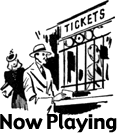
![]()

|
This week: |
Filthy says: |
|
| Man,
I wished I lived in the depression. It looked pretty fucking sweet.
It's all old-timey, and everyone's dressed up like they're going
to a big hobo ball. Nobody ever yelling at you to get a job, and
all the soot you can eat. Riding the rails from town to town,
sleeping under scratchy wool blankets, being sort of greasy and
dirty, and probably stinking too, without anyone telling you to
take a shower because those cost thousands of dollars. Pissing
in the street, and shitting on the sidewalks. Cheap liquor that
could give you Jake Leg. Living in the sewers and getting free
monkeys from the government. Shit, I bet that was a great time
to be alive.
The Great Depression, they call it, but if it happened now we'd remember it as the Awesome Depression. So it's no wonder that directors love to base their movies in the depression. You get credit for being historic and dramatic, and it's probably pretty cheap to cover everyone in shit and make them look sad and old fashioned. Cheaper than space ships or car chases, that's for sure. Cinderella Man is a depression-era boxing story that wrings its setting for all its worth. Like a whiskey-laced dishrag at an AA meeting. This thing yanks at your heartstrings and plays up the starvation and squalor for all its worth. And damned if it doesn't do a pretty good job of it. Normally this old-timey crap has as much appeal for me as going to one of those fake country stores that smell like potpourri and sell lumpy patriotic sweaters. But I read where Cinderella Man was about Jm J Bullock getting the shit beat out of him. I'd happily pay to see that jackass get what's coming to him for all the grief he caused Ted Knight. But like the time I set my face on fire lighting a Duraflame log, I read wrong. The movie is not about Jm J. Bullock, but Jim J. Braddock, who never played a flamboyant gay character on a crappy 80s sitcom. He was a real-life boxer in the 1930s whose best skill was his ability to get beaten to a bloody pulp and not fall down. It's an enviable skill, really. I can't tell you the number of times I have had the shit beat out of me and crumpled like a paper bag. It would be awesome to be able to stand there and take some more. Boy, would that make those teenagers mad. This is one of those prestige pictures, loaded with superstar actors and directed by Ron Howard, who can bury everything he touches in fake sincerity and melodramatic horseshit. Russell Crowe plays Braddock, Rene Zellweger plays the dedicated wife, and Paul Giamatti is the fight promoter with a heart of gold. I would guess that role was originally a whore with a heart of gold, but then the filmmakers realized nobody wanted to see Giamatti naked. In Cinderella Man, Crowe is a family man who sees boxing as his way to pull himself up by the bootstraps. Bootstrapping appears to be the main occupation of people during the Depression. At least, it's the only thing Hollywood ever tells us about. I'd love to see a movie about guys yanking themselves down into the much by their underwear. Jockstrapping, I believe it's called. Or maybe teabagging. So, Crowe is so often injured in fights that his once upwardly-mobile career comes to a grinding halt due to injuries. His license to fight is revoked and he can't get a fight or a paycheck. His family, three kids plus Zellweger, live in rustic squalor, sharing beds and coughing from the cold, mixing water into milk to make it last. He picks up work wherever he can, but the heat is shut off and there is no food in the pantry. Through a stroke of luck, Crowe is offered a last fight with a big paycheck. He's told it will not lead to a comeback, it's a one-shot deal against a contender he has no hope of beating. So, of course, he wins. And rather than it being the last fight, it makes him an underdog hero to the downtrodden of the depression. He gets another chance, and then another, right up until he gets to fight for the title against the killer Max Baer (Craig Bierko). Much is made of the fact that Baer killed two men in the ring and generally acted like a jackass. There are two ways a movie like this ends: first is for the underdog to win, and not just win for himself, but to win for every oppressed person in the world, aka the Mighty Ducks Syndrome; second is for the underdog to lose, but to put up such a fight that he inspires losers everywhere, aka the Bad News Bear/Rocky Syndrome. Cinderella Man is the former kind, where Crowe stands up to the maniacal, dirty cheat opponent and wins, and churches filled with priests listening by radio throw up their arms and know it's exactly what Jesus would have wanted. I'm not sure if there is a third way these sports movies can end, but if there is, I hope it has something to do with glue sniffing, falling down a flight of stairs and still being adored by the masses. That's the ending some of us need to have hope in our lives. I'm having a pretty damn hard time figuring out why this movie worked as well as it did. It's pure formula, it;s long and self-important. It's a boxing movie, but made for women. Crowe's character is portrayed as such an impossible underdog that I'm surprised they didn't give him polio or a peg leg, or, better yet, no arms. Now that would be one hell of an uplifting movie; the story of an armless man who, against all odds, bit his way to a world title. Crowe is very good. He's not armless, which would have guaranteed an Oscar, and his role is too saintly to fully believe, but the guy is just a damn good actor. Zellweger doesn't have a lot to do, but at least she doesn't die and the marriage is portrayed as strong and unified. The ultimatum not to fight anymore comes late in the movie and is half-hearted, and that's a welcome change. When the kids get sick, they also get better, which is a nice turn away from the afflicted or dead child that turns up in Hollywood as often as in Sudan. The bad guys are the fat cats who ride around in fancy cars during the depression, and the good guys are the dirty-faced bums. It's corny, for sure, but movie portrays gets away with it. Maybe it's that the Howard really believes in these outsized characters, or that I wanted to believe that my life has been rendered asunder by some unseen and incredibly wealthy force. The fight scenes are a bit soft and girly, but still really well done. Despite the sepia-tone and romanticizing, they really are visceral, and there are plenty of them. It sort of reminded me how much I like to watch other people fight for a change, people who don't resort to slapping and hair-pulling. The movie's pacing is hit and miss. It moves along quickly at first, then slows to a crawl as Crowe is turned away from boxing and has to entangle himself in irrelevant side stories meant to drive home how great a guy he is. It picks up again at the end, when Crowe and Bierko fight. Holy shit, it's a long fight, like maybe the last 30 minutes of the movie. and when Crowe wins, it neatly wraps up all the loose sends. Now, some of you may complaint that I've given away the ending. Too fucking bad bad. It's a matter of history, and before you write to piss and mona, here's another spoiler: the Nazis lost World War II. Here's one more: we lose World War III. To Nazis. Cinderella Man is formula, it's cliche, it's a bit sappy and predictable. But God dammit, it works. Three Fingers. |
 |
|
Shawn Edwards of Fox Television The Sisterhood of the Traveling Pants is "Four Stars! Excellent! The most charming and wonderful movie you'll see all year!" |
 Filthy's Reading Bernard Malamud - The Complete Stories Listening to Deerhoof - Reveille Watching Riding the Rails  |



